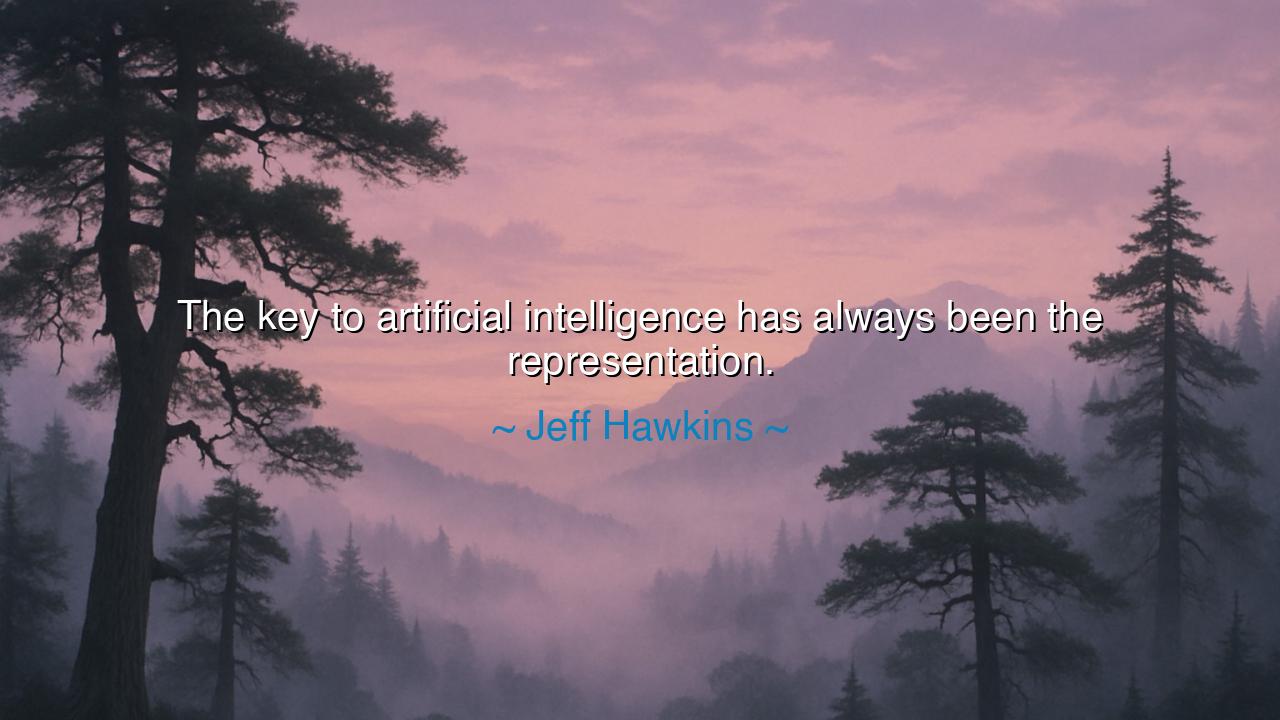
The key to artificial intelligence has always been the






The words “The key to artificial intelligence has always been the representation,” were spoken by Jeff Hawkins, a thinker who sought to bridge the mystery of the human mind with the machinery of logic and silicon. He was not merely speaking of computers or algorithms, but of something far more profound—the ancient quest to understand intelligence itself. For Hawkins knew that to make machines think, one must first uncover how thought is shaped and held within the mind’s invisible architecture. The word “representation” in his vision is not just technical—it is spiritual. It speaks of how reality is mirrored within us, and how knowledge, once captured, gives birth to understanding.
In the beginning, humankind looked outward—to the stars, to the stones, to the sea—and wondered how to make sense of the vastness. From this wonder came the first representations: the cave painting, the story, the symbol, the map. These were the original forms of artificial intelligence, for they allowed human beings to store and share knowledge beyond the limits of memory. Each image scratched on stone was a thought preserved, a mirror of the world made visible. So too, Hawkins reminds us, is every neuron in the brain a painter, each firing pattern a small representation of reality. Intelligence, whether biological or artificial, is born when these fragments of representation weave themselves into a pattern—a world inside the mind that reflects the one outside.
Consider the great Leonardo da Vinci, whose notebooks were filled with drawings that transformed nature into knowledge. He saw the beating of wings and represented it with sketches, formulas, and dreams of flight. His genius lay not in observation alone, but in his ability to represent—to hold reality in the mind until it yielded its secrets. Centuries later, the same principle guides our machines: they too must learn not merely to process, but to represent—to see, to interpret, to imagine. Hawkins’ insight, then, is not a new discovery, but a continuation of humanity’s oldest wisdom: that the power to know lies in the power to reflect.
Yet this truth holds not only for machines, but for the soul. For every human being, too, is an architect of representation. We do not live in the world as it is; we live in the world as we perceive it. Two people may see the same sky—one beholds a storm, the other a promise. Thus, our lives are shaped by the images we hold within, the models we create of others, of ourselves, of destiny. If our representations are narrow, fearful, or false, our intelligence becomes limited, no matter how clever we appear. But if our representations are broad, compassionate, and true, then we see the world as it truly is—and our actions become wise.
Jeff Hawkins’ wisdom whispers to us, then, a timeless message: to improve intelligence, whether in machines or in men, one must refine perception. The key is not in speed or power, but in clarity—the ability to represent reality faithfully, to see connections others overlook. For a mind that misrepresents the world, however brilliant, becomes a prisoner of its own illusions. But a mind that represents truth, even simply, walks in harmony with the laws of the universe.
From this, we learn a vital lesson: in life, as in science, cultivate the art of clear representation. See things as they are, not as you wish them to be. When you speak, represent others fairly. When you judge, represent facts with honesty. When you dream, represent possibility without delusion. The wise person builds inner models of truth and acts from them, while the foolish one builds fantasies and wonders why his world collapses.
Therefore, remember, seekers of knowledge: representation is the mirror of the mind. Keep it clean. Sharpen it with curiosity, polish it with humility, and illuminate it with empathy. Whether you shape machines or mold your own soul, this principle will guide you. For the key to all intelligence—artificial or divine—has always been this: to represent reality not as we desire it, but as it is, and in doing so, to rise from mere perception to understanding, from imitation to wisdom, and from knowledge to truth eternal.






AAdministratorAdministrator
Welcome, honored guests. Please leave a comment, we will respond soon